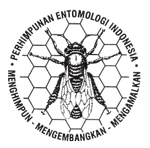Pengaruh Beauveria bassiana terhadap Mortalitas Semut Rangrang Oecophylla smaragdina (F.) (Hymenoptera: Formicidae)
DOI:
https://doi.org/10.5994/jei.6.2.53Keywords:
Beaveria bassiana, mortality, Oceophylla smaragdinaAbstract
The study was conducted at the laboratory and cacao plantation in Kaliwining Jember, during August to November 2008. The objective of this research was to study the effect of B. bassiana on the mortality of larvae, pupae and adults of O. smaragdina. A factorial completly randomized design was used in the laboratory experiment. Two factors were tested in the experiment, the first factor was spore concentration; the second factor was the stadia of the ants (larva, pupa and adult). The experiment was replicated, 4 (four) times. The field research used a randomized block complete design with four treatments and four replications. Results of this study showed that B. bassiana was the mortality source of larva, pupa and adult stages of O. smaragdina. A concentration of 108 spores/ml B. bassiana was effective to control larvae and pupae of O. smaragdina.Downloads
Downloads
Published
How to Cite
Issue
Section
License
Authors who publish with this journal agree to the following terms:
- Authors retain copyright and grant the journal right of first publication with the work simultaneously licensed under a Creative Commons Attribution 4.0 International License that allows others to share the work with an acknowledgement of the work's authorship and initial publication in this journal.
- Authors are able to enter into separate, additional contractual arrangements for the non-exclusive distribution of the journal's published version of the work (e.g., post it to an institutional repository or publish it in a book), with an acknowledgement of its initial publication in this journal.
- Authors are permitted and encouraged to post their work online (e.g., in institutional repositories or on their website) prior to and during the submission process, as it can lead to productive exchanges, as well as earlier and greater citation of published work (See The Effect of Open Access).








